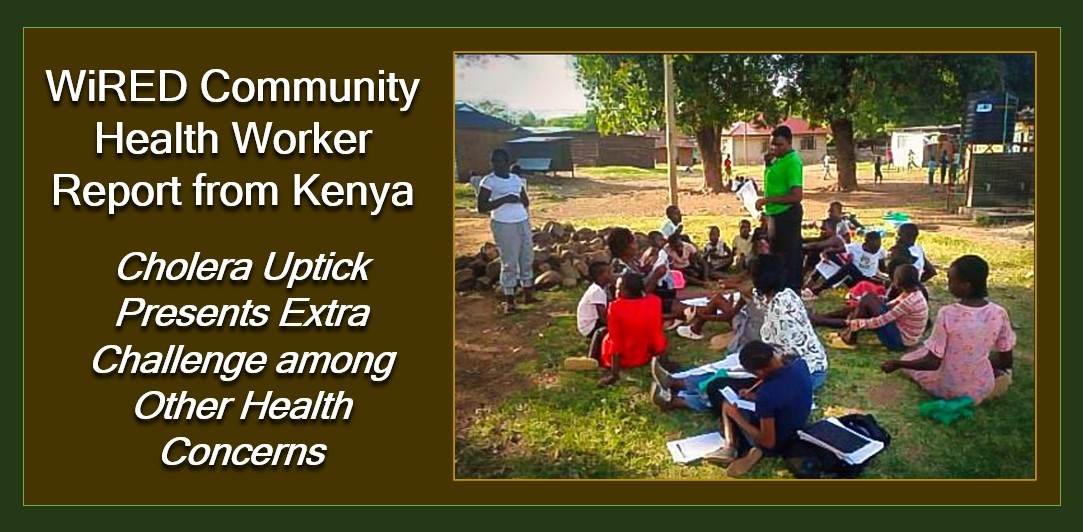By Allison Kozicharow; Edited by Elizabeth Fine
Introduction
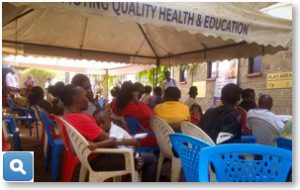 In May the World Health Organization reported that Kenya is boosting its national cholera preparedness and response amid cholera outbreaks during the rainy season.
In May the World Health Organization reported that Kenya is boosting its national cholera preparedness and response amid cholera outbreaks during the rainy season.
Also in May, not surprisingly, WiRED International’s community health workers (CHWs) in Kisumu, Kenya named cholera as the #1 health concern in their communities.
Efforts to control infectious and noninfectious diseases have been greatly hampered by the Trump administration’s abrupt cuts to global health programs — programs underserved countries such as Kenya depended on for assistance with medicine and vaccines.
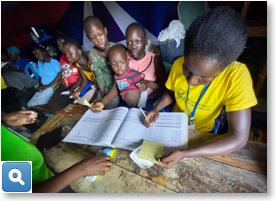 On May 14, in the Ranking Member’s Press release from the U.S. Congress Foreign Relations Committee titled “The Dangerous Consequences of Funding Cuts to U.S. Global Programs.” Dr. Atul Gawande, former Assistant Administrator for Global health, USAID told the committee:
On May 14, in the Ranking Member’s Press release from the U.S. Congress Foreign Relations Committee titled “The Dangerous Consequences of Funding Cuts to U.S. Global Programs.” Dr. Atul Gawande, former Assistant Administrator for Global health, USAID told the committee:
- Our 50-country network for stronger surveillance to deadly diseases from bird flu to swine fever [is] gone.
- Our emergency response system that cut response times to global outbreaks from greater than two weeks to less than 48 hours [is] gone.
- AIDS programs to prevent new cases of HIV in high-risk populations [is] gone.
- Programs for preventing child and maternal deaths that reached 93 million women and children under 5 in 2023 and added 6 years of life on average [has been] cut 92%.
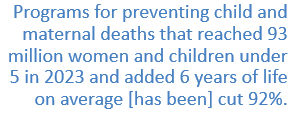 Lifesaving tuberculosis programs cut [by] 56%.
Lifesaving tuberculosis programs cut [by] 56%.- Lifesaving water and sanitation programs cut [by] 86%.
- Funding for GAVI, the global vaccine alliance, which was set to vaccinate half a billion children [was] terminated and, if not restored, will cost 500,000 lives a year and drive higher exposure to measles in the U.S.
Outcomes
WiRED initiated a new reporting system for our CHWs last March. The new outcomes procedure will record data on CHW home visits, referrals and follow-up and help us understand the direct interventions and level of care CHWs provide. The following include sample outcomes for May, noted by individual members of the CHW team.
Cholera
 Many people in Kisumu still do not know the difference between cholera and typhoid symptoms. The headaches and the diarrhea together with fever are symptoms most people experience. They think they have typhoid when they actually have cholera. I talked to a few women in the community. When we talked about cholera further and I educated them they understood the difference between the two diseases, but most importantly they understood why it is better to visit the hospital and not diagnose any disease by yourself. They agreed that they will always go to the hospital in case of an illness that cannot be treated through first aid.
Many people in Kisumu still do not know the difference between cholera and typhoid symptoms. The headaches and the diarrhea together with fever are symptoms most people experience. They think they have typhoid when they actually have cholera. I talked to a few women in the community. When we talked about cholera further and I educated them they understood the difference between the two diseases, but most importantly they understood why it is better to visit the hospital and not diagnose any disease by yourself. They agreed that they will always go to the hospital in case of an illness that cannot be treated through first aid.
Malaria
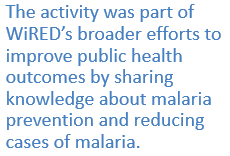 We held a malaria education session in Obunga informal settlement in Kisumu this May. The activity was part of WiRED’s broader efforts to improve public health outcomes by sharing knowledge about malaria prevention and reducing cases of malaria. During the classes, we engaged the community in identifying and eliminating mosquito breeding grounds. Participants shared their experience with malaria and breeding sites. The sessions turned out to be successful and impactful: 40 residents of Obunga gained knowledge about malaria and were referred to health facilities to be helped with malaria preventive tools, which will be key to reducing malaria in Obunga.
We held a malaria education session in Obunga informal settlement in Kisumu this May. The activity was part of WiRED’s broader efforts to improve public health outcomes by sharing knowledge about malaria prevention and reducing cases of malaria. During the classes, we engaged the community in identifying and eliminating mosquito breeding grounds. Participants shared their experience with malaria and breeding sites. The sessions turned out to be successful and impactful: 40 residents of Obunga gained knowledge about malaria and were referred to health facilities to be helped with malaria preventive tools, which will be key to reducing malaria in Obunga.
Challenges to controlling malaria include lack of community resources for prevention and net distribution and difficulties accessing health facilities due to financial constraints. We recommend increasing the number of education sessions to reach more residents of Obunga and strengthening CHW engagement for follow-up activities and outreaches.
HIV/AIDS
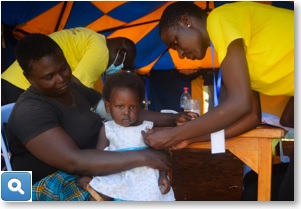 As I was teaching about HIV/AIDS, I had a client who had decided not to continue taking his antiretrovirals because of the side effects he was experiencing. I took him through counselling not only on HIV/AIDS but also nutrition. After that, I took him to the health center where he was taking his medication and helped him discuss the side effects with the health provider. We talked about adherence to medication. Right now, he is responding well with the medication though the side effects are still there, but minimal. In addition, the patient used to abuse drugs and alcohol, but nowadays the patient is not abusing any drug.
As I was teaching about HIV/AIDS, I had a client who had decided not to continue taking his antiretrovirals because of the side effects he was experiencing. I took him through counselling not only on HIV/AIDS but also nutrition. After that, I took him to the health center where he was taking his medication and helped him discuss the side effects with the health provider. We talked about adherence to medication. Right now, he is responding well with the medication though the side effects are still there, but minimal. In addition, the patient used to abuse drugs and alcohol, but nowadays the patient is not abusing any drug.
In the community at field work, I had a client who was a defaulter. I took him to Lumumba health center where he was taking his medication for further treatment. I have been doing follow up and the patient is responding positively in spite of the side effects.
Other Health Concerns and Conclusion
 CHWs cover many different health topics in any given month of their work (see sidebars.) In addition to May’s top health concerns, CHWs wrote up success stories and outcomes that included a wide range of issues: pneumonia, human papilloma virus (HPV), drug and substance abuse, water treatment, menstrual hygiene and child immunization. CHWs also held sessions on cancer education using WiRED’s Cancer series.
CHWs cover many different health topics in any given month of their work (see sidebars.) In addition to May’s top health concerns, CHWs wrote up success stories and outcomes that included a wide range of issues: pneumonia, human papilloma virus (HPV), drug and substance abuse, water treatment, menstrual hygiene and child immunization. CHWs also held sessions on cancer education using WiRED’s Cancer series.
Hosting health training sessions in addition to treating and referring people educates the whole community about their health and how to protect it. CHWs continue to be trusted sources for accurate health information, especially in challenging times in global health care.
May CHW Report Statistics
During the month of May 2025, 20 CHWs in Kisumu, Kenya, reached a total of 9,579 people with health services. Working 24 hours per week, each of the CHWs met with at least 43 patients a week, and the largest number seen in a week by a single CHW was 199, most of them in health training classes.
Top health concerns for the month of May in order of prevalence:
- Cholera, by far
- Malaria
- HIV/AIDS
- Tuberculosis
- Mental health
- Cancer
The following list is all in a day’s work for WiRED’s 20-member paraprofessional CHW team. Their work includes:
- Hosting group sessions about disease awareness, prevention and treatment
- Talking one-on-one with people
- Screening for illnesses
- Treating common complaints
- Providing simple medications to ease pain in the midst of stoppage of health funding programs, especially from the United States
- Performing home visits and offering home care
- Making referrals to clinics as needed
- Following up with patients to check on their recovery and ensure that they are taking any prescribed medications properly
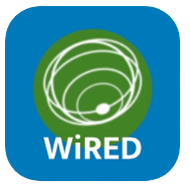 Accessing WiRED’s library of health modules through our apps (Android app and Apple)
Accessing WiRED’s library of health modules through our apps (Android app and Apple)- Taking WiRED-required continuing medical education to remain up to date with their skills.


